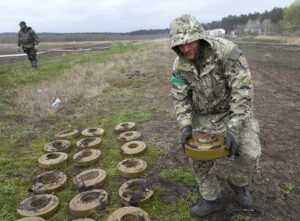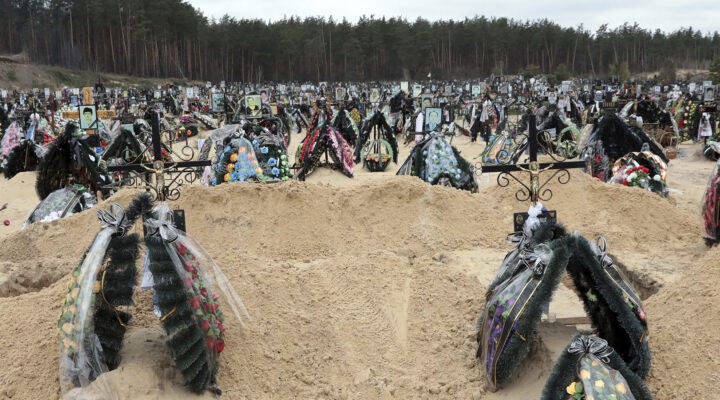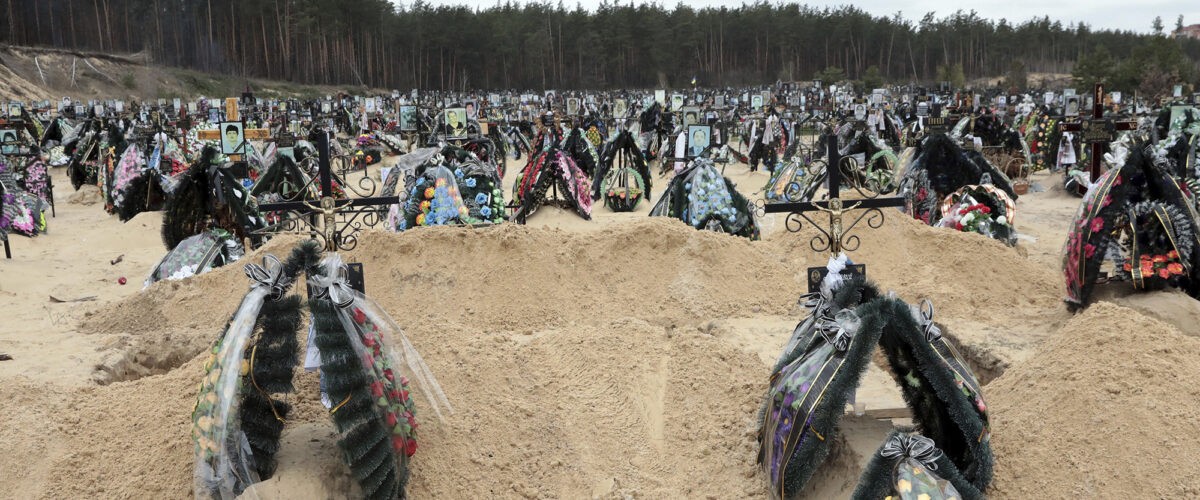As the Russian assault on Ukraine passed the two-month mark yesterday, the humanitarian work involving churches across the country continued unabated. But church volunteers are being called upon to do things no Bible study lesson could have prepared them to do.
In the Ukrainian town of Irpin, volunteers from Irpin Bible Church are working there and in nearby Bucha, delivering food to survivors and helping with the clean-up operation. They are even assisting in the dangerous task of de-mining the area. Russian troops reportedly left behind many such mines to kill and maim Ukrainians even after the invading troops have fled.

An interior ministry sapper collects mines on a mine field after recent battles in Irpin close to Kyiv, Ukraine, Tuesday, April 19, 2022. (AP Photo/Efrem Lukatsky)
In perhaps one of the most understated prayer requests ever, the Coordination Center of Ukrainian Baptists said of the mine-sweeping volunteers there is a need “for prayers for their strength and safety.”
According to reports through the European Baptist Federation, members of the Irpin church did not leave the city even while the war raged.
Their church building was badly damaged in a bombing raid as the occupying forces left. The congregation had bought the building a year before and had spent eight months converting it. Although this is a blow for them, the pastor remains optimistic.
“We believe that the Lord will give us the opportunity to rebuild the church building and make it even more convenient to serve the Lord,” the pastor said. “But most importantly, we pray for our people in Irpin and try to serve them, so that they will see that in the most difficult times, the Lord is near.”
After eight weeks of war, Ukraine has been plunged into a human rights and humanitarian crisis, said United Nations High Commissioner for Human Rights Michelle Bachelet. Speaking on April 22, she said Russian forces have not only ignored but “tossed aside” international humanitarian law.
Russian armed forces have indiscriminately shelled and bombed populated areas, killing civilians and wrecking hospitals, schools and other civilian infrastructure, actions that may amount to war crimes, she explained.
Since the Russian invasion began Feb. 24, the United Nations has documented 2,345 civilian deaths and 2,919 civilian injuries from the fighting.

Inside a studio at UN Headquarters Ms. Michelle Bachelet is the first Under-Secretary-General and Executive Director of UN Women records a video message.
“We know the actual numbers are going to be much higher as the horrors inflicted in areas of intense fighting, such as Mariupol, come to light,” Bachelet said. “The scale of summary executions of civilians in areas previously occupied by Russian forces are also emerging. The preservation of evidence and decent treatment of mortal remains must be ensured, as well as psychological and other relief for victims and their relatives.”
During a visit to Bucha April 9, U.N. human rights officers documented the unlawful killing, including by summary execution, of 50 civilians.
“Almost every resident in Bucha our colleagues spoke to told us about the death of a relative, a neighbor or even a stranger,” Bachelet noted. “We know much more needs to be done to uncover what happened there, and we also know Bucha is not an isolated incident.”
The U.N. human rights group has received more than 300 allegations of killings of civilians in towns in the regions of Kyiv, Chernihiv, Kharkiv and Sumy, all under the control of Russian armed forces in late February and early March.
Moreover, the U.N. also has recorded 114 attacks on medical establishments in Ukraine, although the actual figure is likely to be considerably higher. Bachelet said the disruption of medical care has caused the general mortality rate among civilians to increase in a number of besieged towns and cities.
“We estimate at least 3,000 civilians have died because they couldn’t get medical care and because of the stress on their health amid the hostilities,” she said. “This includes being forced by Russian armed forces to stay in basements or not being allowed to leave their homes for days or weeks.”
Also, allegations of sexual violence against women, men, girls and boys by members of the Russian armed forces in Ukraine have increasingly surfaced, she said, with 75 such allegations already on record.
“Our work to date has detailed a horror story of violations perpetrated against civilians,” Bachelet said.
“Our work to date has detailed a horror story of violations perpetrated against civilians.”
Amid this horror, the U.N. High Commissioner on Refugees says more than 5 million people have fled Ukraine — mainly women, children and the elderly. Poland now is home to more than 2.8 million Ukrainian refugees, while Romania has taken in more than 763,000, Hungary 476,000 and Moldova more than 428,000.
The European Baptist Federation reports that escalation of the conflict in eastern Ukraine “has made it more difficult to evacuate local people. Baptist volunteers have been risking their lives trying to take humanitarian aid into the region and bring people to safety. Christians from Cherkasy have recently helped 90 people to evacuate, but fear this may be their last trip for some weeks.”
Elsewhere, Ukrainian forces have retaken control of areas where Russian forces had terrorized citizens for weeks. In these regions, “almost all the churches in the area have restarted their Sunday services.”
Many members of these churches have lost their homes to bombing. “People here are in great need, both physical and spiritual,” said Volodymyr Vysotsky, head of Chernihiv Baptist Association.
The Baptist response in neighboring countries also continues. Volunteers anticipate a second wave of refugees as Russia focuses intently on the East and South of Ukraine.
In Slovakia, Baptist churches have launched worship services in Ukrainian, and the Baptist Union has arranged for Christian resources in Ukrainian to be printed and distributed. Similar stories are told across Eastern Europe.
Related articles:
In Lviv, there is peace — until people start telling their stories | Opinion by Helle Liht
Let’s be clear: Putin’s invasion of Ukraine is not about the rapture and Russia in biblical prophecy | Analysis by Rodney Kennedy
Religious liberty in Ukraine is ‘doomed’ if Russian invasion succeeds


